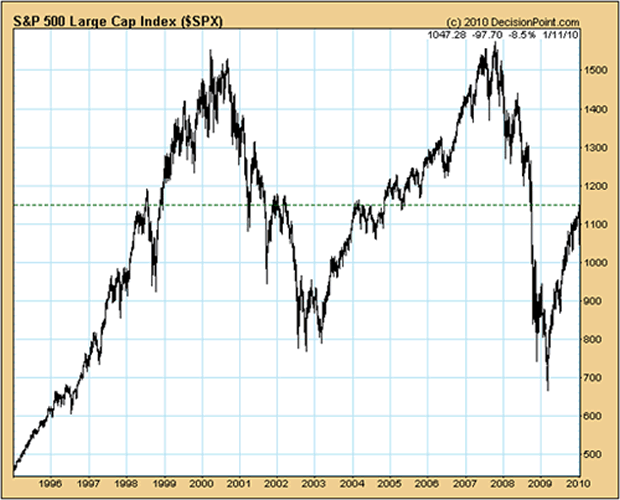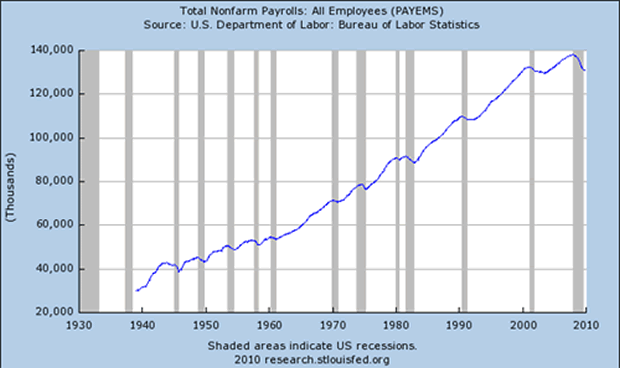Unemployment The Most Important Challenge Facing the U.S. Economy
Economics / US Economy Jan 13, 2010 - 09:33 AM GMTBy: Claus_Vogt
 From the start of the economic and financial crisis that began in 2007, I made it clear that this was not a garden variety recession. Instead, I said, it was the aftermath of the bursting of the largest real estate bubble the world had ever seen.
From the start of the economic and financial crisis that began in 2007, I made it clear that this was not a garden variety recession. Instead, I said, it was the aftermath of the bursting of the largest real estate bubble the world had ever seen.
Many developments of the past three years support my thesis. Now I predict that this will not be a garden variety recovery either. We should expect some false starts in the economy and a bear market rally for stocks.
And my prediction has two important observations backing it up …
Observation #1 — A Secular Bear Market in Stocks
Take a look at the chart below to see what I mean by this. At Monday’s closing price of 1,147 the S&P 500 Index was at about the same level as in the summer of 1998. So investors who bought stocks 11 years ago, haven’t earned a single dime. And if you consider inflation, they’re actually down by a whopping 25 percent!

The rollercoaster ride from 1998 until today could teach investors a lot about Wall Street and the madness of crowds, about greed and angst — and about themselves if they dared listening. For most investors, though, these lessons have been extremely expensive. And sadly, the rollercoaster hasn’t stopped yet.
The stock market is still overpriced … normalized price earnings ratios, as well as dividend yields and other traditional measures of valuation, are not even close to where they have been during historical long-term buying opportunities. In fact, they’re at levels commensurate with long-term tops!
Hence, I strongly believe that the rollercoaster has not ended its blood-freezing tour. And it’s only climbing the next interim top after which another fast descent will take place — probably below the March 2009 lows.
Next, let me give you …
Observation #2 — A Secular Bear Market in Employment
Real prosperity goes hand in hand with employment. So even if the GDP was growing strongly, doing so without job growth wouldn’t feel right and would probably be just a mirage.
Now look below at my second chart … total nonfarm payrolls. As you can see something very unusual happened here. For the first time since this data series became available, all the jobs created during a prior economic expansion have been lost. Akin to the stock market’s numbers, we are now at the same employment level as 10 years ago.

Source: Federal Reserve Bank of St. Louis
Just think about it: No new jobs in a country with a population growing 1.1 percent per year. That’s about 3.2 million people each year … 32 million over 10 years … yet no new jobs!
The U-3, the official and often cited unemployment rate, is 10 percent. However, the no less official but rarely cited U-6 unemployment rate, which includes discouraged workers, marginally attached workers, and part time workers who want to work full time, comes in at 17.3 percent.
This is a frightening development, a development fitting a depression much more than a garden variety recession.
A Negative Economic Outlook
 |
| “I don’t think many people grasp just how much job creation we need to climb out of the hole we’re in.” — Paul Krugman, New York Times columnist |
Even Nobel Prize winner and columnist Paul Krugman, the pop star of the U.S. economists who didn’t see the crisis coming, recently estimated that the U.S needs 300,000 new jobs each and every month for the next five years — 18 million in total.
But that’s not happening … Friday’s nonfarm payroll report showed a loss of 85,000 jobs during December. To me, that’s further evidence that the stock market’s recovery has not begun.
Historically, payrolls start to expand immediately after a recession is over. So maybe this recession is not really over yet, or maybe it’s something else, that is to say a depression, currently waiting for the next shoe to drop.
Dr. Krugman, as I said, didn’t see the whole mess coming. But he sure knows what the remedy should look like. His suggestion: The Fed should expand its balance sheet by another $2 trillion.
Obviously Krugman recommends inflating our way out of this crisis. He probably believes in the so called Phillips curve. It stipulates an inverse relationship between the rate of unemployment and the rate of inflation … when unemployment rises, inflation drops and vice versa. It was very popular during the 70s.
Helmut Schmidt, former German Chancellor, famously justified this theory by saying to prefer a few more percentage points of inflation to a few more percentage points of unemployment. He finally got both in spades.
Is it possible that the very same policy will lead to comparable results in the U.S.? History is full of examples of post-bubble economies that clearly show us to expect a long, drawn out adjustment process. And with Helicopter Ben at the Fed’s helm, a government dead set on a spending and a debt binge never seen before, I fear the worst.
Best wishes,
Claus
This investment news is brought to you by Money and Markets . Money and Markets is a free daily investment newsletter from Martin D. Weiss and Weiss Research analysts offering the latest investing news and financial insights for the stock market, including tips and advice on investing in gold, energy and oil. Dr. Weiss is a leader in the fields of investing, interest rates, financial safety and economic forecasting. To view archives or subscribe, visit http://www.moneyandmarkets.com
© 2005-2022 http://www.MarketOracle.co.uk - The Market Oracle is a FREE Daily Financial Markets Analysis & Forecasting online publication.



